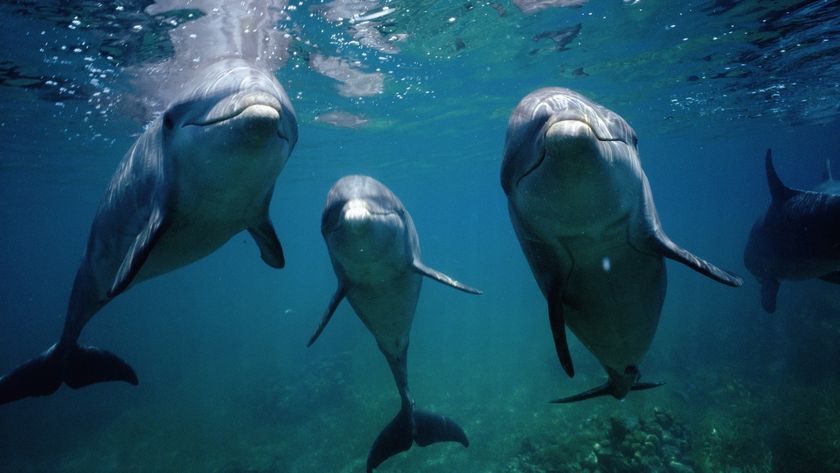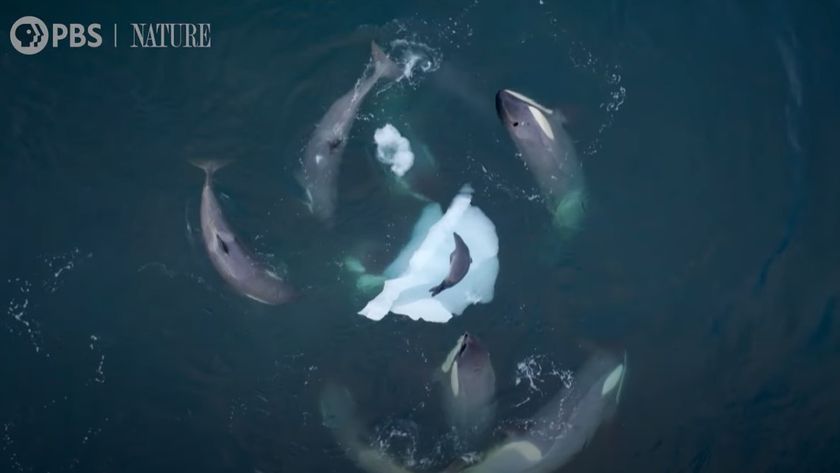Baby Dolphins Dying By the Dozen In the Oily Gulf
In the past month, 26 dead baby dolphins have washed ashore along the U.S. Gulf Coast. This is calving season for the dolphins, but in most years, only a couple of calf carcasses are found on shore. The incidence of dead newborns and stillborns found this season is "an anomaly," according to Moby Solangi, director of the Institute of Marine Mammal Studies in Gulfport, Miss.
Solangi and other marine scientists suspect a connection between the calf deaths and the three-month-long Deepwater Horizon oil spill that dumped 5 million barrels of oil into the Gulf of Mexico beginning in April 2010. Oil slicks on the ocean surface could have caused serious health problems for dolphins, Solangi told Reuters.
"We take short breaths. These animals take a huge breath at one time and hold it. And when they take it, the fumes stay in the lungs for a long period of time and they cause two types of damage, one of which is immediate to the tissue itself. Second, the hydrocarbons enter the bloodstream," he said.
The oil spill has been implicated in the near-tripling of documented adult dolphin deaths last year, from 30 in a normal year to 89.
Dolphin gestation lasts for 11 or 12 months, so calves born now would have been conceived about two months before the oil spill began. Solangi and others are looking for toxic chemicals in the tissue of the dead dolphin calves to determine if they too were affected by the oil spill while in the womb.
- Can the Gulf Oil Spill Harm Babies In the Womb?
- Why Do Birds Die In Big Groups?
- Why Do Whales Beach Themselves?
Got a question? Send us an emailThis e-mail address is being protected from spambots. You need JavaScript enabled to view it This e-mail address is being protected from spambots. You need JavaScript enabled to view it This e-mail address is being protected from spambots. You need JavaScript enabled to view it This e-mail address is being protected from spambots. You need JavaScript enabled to view it This e-mail address is being protected from spambots. You need JavaScript enabled to view it This e-mail address is being protected from spambots. You need JavaScript enabled to view it and we'll crack itThis e-mail address is being protected from spambots. You need JavaScript enabled to view it . Follow Natalie Wolchover on Twitter @nattyover
Sign up for the Live Science daily newsletter now
Get the world’s most fascinating discoveries delivered straight to your inbox.
Natalie Wolchover was a staff writer for Live Science from 2010 to 2012 and is currently a senior physics writer and editor for Quanta Magazine. She holds a bachelor's degree in physics from Tufts University and has studied physics at the University of California, Berkeley. Along with the staff of Quanta, Wolchover won the 2022 Pulitzer Prize for explanatory writing for her work on the building of the James Webb Space Telescope. Her work has also appeared in the The Best American Science and Nature Writing and The Best Writing on Mathematics, Nature, The New Yorker and Popular Science. She was the 2016 winner of the Evert Clark/Seth Payne Award, an annual prize for young science journalists, as well as the winner of the 2017 Science Communication Award for the American Institute of Physics.












